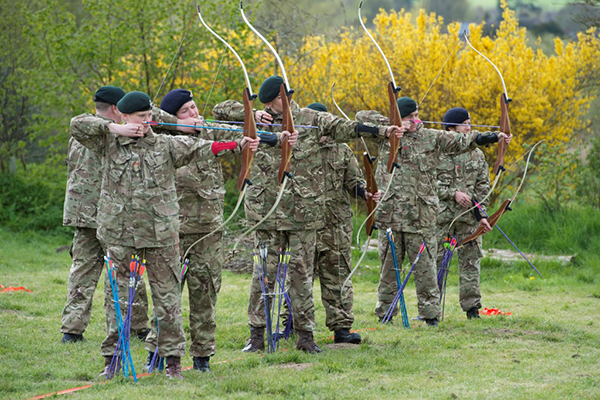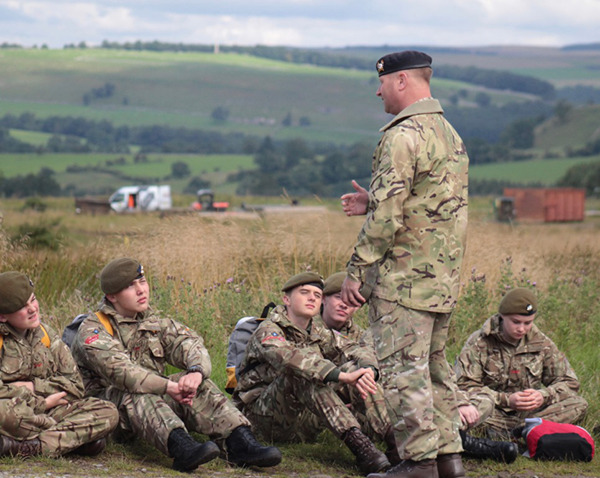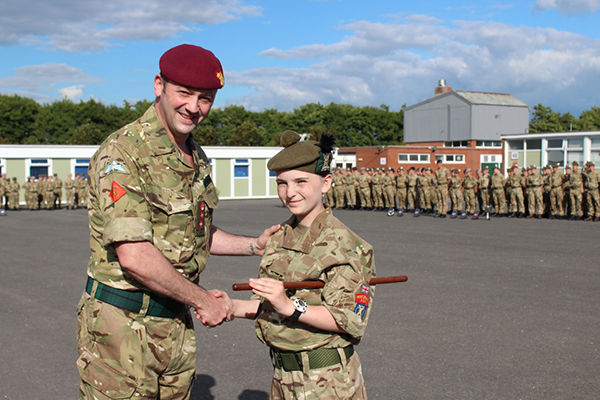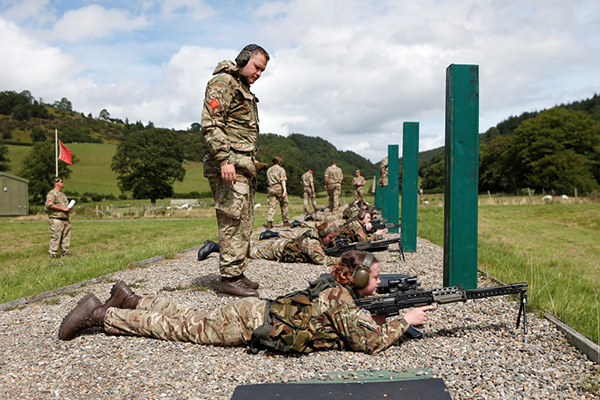ACF Cadet - Officer/Adult Instructor Expectations
So what does your Officer or Adult Instructor expect from you?
Like you, they are volunteers; the Army Cadet Force is their hobby. Your Detachment will only be as good as you and other Cadets make it. Your Detachment Commander and Adult Instructors are there to encourage and train you. Work as a team - even if you do not particularly like someone; let’s face it, it could be useful to learn how to work with people you do not like! Being a member of the ACF gives you opportunities to grow in knowledge and experience.
The Enrolment Ceremony
The first few weeks you parade at your Detachment you will take part in your Basic Training. if you attend regularly, you will be ENROLLED in about six to eight weeks. You are then officially allowed to wear the Cap Badge of the Regiment or Corps to which your Detachment is affiliated. The format of the Enrollment Ceremony varies, but usually your OC will have invited your parents or guardians, and possibly the Padre to help officiate in the ceremony. Normally, each Cadet being enrolled has two friends from the Detachment who are appointed as his/her ‘sponsors’. They will help you through this milestone in your Cadet career. The Enrollment Ceremony serves as a reminder to the other Cadets of their commitments to their Detachment and the ACF. The Enrollment Ceremony is personal to the Cadets taking part. Usually no more than two cadets are enrolled at a time.
The minimum joining age to the ACF is 12th birthday. Therefore new joiners will need to be made welcome straight away. Their Sponsors have a special responsibility to see that this is carried out.
Your detachment Commander will expect you to:
- Be smartly turned out both in uniform and in your normal clothes.
- Wear your uniform correctly - keep it clean and well pressed.
- Walk tall, don’t slouch - you can look ten centimeters taller!
- Read and comply with notices and orders put up on the notice board.
- Obey orders - if they seem unfair, obey them and complain after.
- Remember your good manners.
- Look after new recruits; make them feel part of the Detachment.
- Treat other peoples property with respect ; prevent damage and vandalism.
- Never be afraid of doing more than you have been asked to do
- Keep fit, play and work hard, take part in sports and games.
- Work in the Detachment as you SHOULD DO at home – be prepared to help with the ‘chores’ without having to be asked.
- Be tidy; do not rely on others to clean up after you.
- Be on time - five minutes before time!
- Remember to let your Detachment Commander know in good time if you are unable to attend a weekend/camp etc. Just not turning up is not good enough, nor is it good manners.
Be a “Full Member
Whenever events, parades, sporting events, weekend training, Annual Camps are planned, your Detachment Staff and others at Company and County/Sector level will have spent many hours in planning a full and interesting programme. This is all organised for your benefit.
What does being a “Full Member” mean?
Like your Detachment Commander and Adult Instructors, you have other responsibilities outside the ACF, with the time you have available for Cadets,put maximum effort in to becoming a good Cadet.
A good Cadet is a full member, and is expected to:
- Take an active part in the life of the Detachment and make the progress required not only in training but also as a person.
- Help others who find it difficult to learn new skills.
- Look after new recruits; make them feel part of the Detachment.
- When your Detachment is “Open to recruit” encourage those who you feel would make good Cadets to attend a Detachment Parade.
- Be ALERT, be SAFETY and SECURITY CONSCIOUS AT ALL TIMES

The ACF Cadet and the Community
A part of the Army Cadet Force Charter reads:
“To inspire young people to achieve success in life with a spirit of service to the Queen, their country and their local community, and to develop in them the qualities required of a good citizen”.
As an individual, a Cadet, you are a CITIZEN. You live in this country, in your own town, city or village. You have family, friends and are part of the community you live in. Every community depends upon people who are prepared to work towards making it a better place to live. During your training, depending on how your Detachment staff plans it, you should be taking part in various projects and activities in your local community.
This is an excellent opportunity to meet the local Civic dignitaries such as the Mayor, local Councilors and those who actively support and work for the community in many ways, through business, profession or charitable work.
It also presents the opportunity for them to meet you and the other Cadets in your Detachment. The impression you make is reflected on you and your Detachment - let it be a good one!
If you are taking part in the Duke of Edinburgh’s Award Scheme, you may chose to undertake community project work as part of your award. Getting involved in the community can often be difficult and demanding, but it can also be great fun and very rewarding.
You may find that you continue working in the community long after you have left the Cadet Force. This will bring you and your unit into close contact with the community in which you live. You will meet new people in a variety of situations, some may be employers, others local councilors, professional people like doctors, solicitors or accountants. It will all present opportunities for them to get to know you, your unit and the Cadet Force and of course for you to get to know them. What impression you make on them will be very important, as it is always said that first impressions are lasting impressions. Were you helpful, did you go out of your way to help, did you have good manners, they will ask you again, what will be their lasting impression of you and your Detachment?.
Safety
All Officers and Adult Instructors have to comply with official safety requirements. There are strict safety rules all cadet activities. If these rules are followed, the risk of someone being injured is reduced. Failure to follow the safety rules can lead to disciplinary action and possibly court proceedings particularly if someone is injured.
How does this work?
Your APC syllabus contains safety training where required. When you are out on exercise, there are briefings to inform you of how, what, when and where. Before you receive your briefing, the Adult
Instructors and Officers have carefully planned the activity and have had their briefings, including the safety aspects.
What do you do?
• Remember your safety rules ALWAYS follow them
• Watch the more junior Cadets, ensure they follow the safety rules
• Listen, (take notes if necessary), when you have your briefing
• Do not fool around at the wrong time
• Know the telephone numbers of: Your Detachment Commander and other Adult Instructors. Your Company/Area Commander and Cadet County HQ. Out on exercise - the mobile number(s) to call in an emergency, not forgetting the Tel No of the Camp you are at.
Annual Camp
For many years the ACF and the Combined Cadet Force have enjoyed the training camps provided by the Ministry of Defence. Annual Camp has always been the highlight of the cadet year. You should always make a special effort to attend. It is a time when all the training you have received during the year is put into practice in ‘the field’, by taking part in exercises and expeditions.
You will be a full time Cadet for the duration of camp and is an ideal opportunity to make new friends and learn new skills. Another opportunity Annual Camp offers you is the chance to be in a
very different part of the country, perhaps for the first time in your life. Try and find out as much as you can, what the area is famous for, what is made there, local customs and history.
Many counties, depending upon the location of the camp have “Open Days”, when parents and friends visit the camp. The day is often planned as a Sports Day, with demonstrations and displays, many of which are organised by the Cadets. Some events are set up to involve visitors making it an entertaining day.
Annual Camp Do’s & Don’ts
The following information should make your camp enjoyable by helping youget the most out of it and keeping you our of trouble.Remember that while you are under the supervision of your Officers and Adult Instructors they are responsible for your SAFETY and WELFARE.
This applies to ANY ACF Cadet activity no matter where it is. Annual Camp like weekend training means you are away from home; your Officers and Adult Instructors are responsible for you even whilst you sleep! The rules, instructions and orders given by your Officers and Adult Instructors are there to protect you. Make sure you follow the rules, if you are an NCO, make sure that you set an example by complying and seeing that they are properly carried out.
Before Camp-Preparation
- Save up for camp - be ready to pay your camp fees when asked. (Note: if you have difficulty in this, see your Detachment Commander, help may be available).
- Get to know when and where you are going as soon as possible.
- Get to know the programme and what you are to be doing.
- Practice some of the training that you will be carrying out at camp, particularly those you are not very good at.
- Get your OC to provide a map of the camp and surrounding area, build up a picture in your mind of what it will be like.
- Do a project on places of interest, special features of the countryside, the people, industries and other interesting information.
- Do you have any friends or relatives in the area - if so you may be able to visit them?
- Check that your uniform fits you properly, if not try and get it changed early enough to give the Quarter Master a chance to help you.
- Check all your kit for camp. Make a list of all your needs and get it organised well before hand. Your OC will give you a checklist for camp; you may find the Annual Camp Check List at the end of this section useful.
- Do your own packing. If you have never packed before, ask for a demonstration. Do not start packing the night before you are due to leave.
- Have your MEDICAL CERTIFICATE (sometimes known as the FFI form - Free From Infection), make sure it is correctly completed and SIGNED by your parent or guardian. Put it into your coat pocket when leaving home for camp.
Medical and Consent Certificate
You will be given a Medical Certificate for your parent/guardian to complete and sign before you go on any adventurous or cadet training activity. Procedures vary, you may have to hand it back to your Detachment Commander, or hand it to the Adult in charge of your activity.
The MoD require this form to ensure cadets are not placed at risk. The level of supervision or care required for a cadet with a medical condition may not be available in the ACF.
For Example only:
- Condition - Epilepsy. Not allowed to undertake such activities as Rock Climbing, Swimming, Shooting, Canoeing, Orienteering, and Expeditions in Wild Country etc.
- Condition - Asthma. Not allowed to undertake activities involving strenuous activity whether or not they are receiving any form of therapy.
- Condition - Diabetes. Those dependent on Insulin treatment may not undertake activities involving irregular meals or long periods of exertion.
- Condition - Heart problems. These are of such a variable nature that a cadets’ medical practitioner must judge them individually. Should any doubts exist on a Cadets’ ability to undertake all the activities listed below, a doctor should be consulted by the parent or guardian before the certificate is signed.
Examples of ACF Physical & Sporting Activities
Rock Climbing, Canoeing, Hang Gliding, Hill walking on Expeditions, Life Saving, Parachuting, Par ascending, Sailing, Rafting, Offshore and Windsurfing. Skiing: Cross Country and Downhill, Water Skiing, Caving, Sub-Aqua Diving. Athletics, Boxing, Circuit Training, Cricket, Cross Country Running, Cycling, Mountain Biking, Football, Rugby, Hockey, Judo, Orienteering, and Swimming.
Medical Consent certificate required for ACF participation in activities such as archery
Important Notice - Insurance
The Ministry of Defence and the Army Cadet Force Association have insurance policies for Cadets who may have an accident. This insurance is only valid if you are taking part in an activity that
is planned and organised as part of your cadet training.
Warning
Therefore if you decide to organise an expedition or exercise WITHOUT AUTHORITY and as a result someone is injured, they would NOT be covered by insurance.
On Your Way to Camp
When traveling by coach or public transport: "Do Not: "
• Make unnecessary noise to the annoyance of other travelers.
• Leave your kit unattended, or in a place dangerous to others.
• Cause problems for coach drivers or those responsible for you.
• Do not deliberately spill drinks, leave litter or cause damage.
• Go wandering off without permission.
When at Camp Do the Following:
- Put most of your spending money in the camp bank (if available) or other means of safe keeping organised by your adult staff at camp.
- Listen and make note of the camp Standing Orders for Security, Fire and Safety instructions. Strictly observe ‘Out of Bounds’ notices.
- Read daily routine orders and comply with them.
- Write, phone or email home to let them know you have arrived safely and remember to keep in touch.
- Remember to wash yourself every day. Leave the washroom as clean as you would wish to find them.
- Clean your kit daily, wash out dirty socks and underclothes - remember to rinse them properly or you will get sore!
- Carry out all duties and “chores” cheerfully and properly.
- Help others - especially the junior cadets who are away from home AND at camp for the first time.
- Be polite to people you meet in the area, particularly the civilian staff in the camp and those who run the cook house and the camp NAAFI.
- Watch out for bullying or signs that another Cadet is really unhappy. If you see it, report it.
- Be safety conscious, report any suspicious persons or events.
- Pull your weight - work hard, play hard, keep your bed space clean and tidy. Most important of all, ENJOY CAMP.
When at Camp Do Not:
- Make work for yourself and others by dropping litter or leaving kit lying about.
- Leave the toilets or washbasins in a dirty state; you will probably have to clean them.
- Never wander off on your own, or in a group without telling anyone where you are going.
- Be a nuisance to local residents by being noisy or ‘fooling about’ in the streets or other public places.
- Hitchhike in uniform as this is not approved.
- Stay out of camp later than permitted, without first having asked for special permission.
- Leave valuable items of personal kit lying about, lock them away safely.
- Do not touch or pick up strange objects on the training area, (remember Camp Standing Orders).
- Get involved with ‘trouble makers’. You will get a bad name for your unacceptable behaviour.





